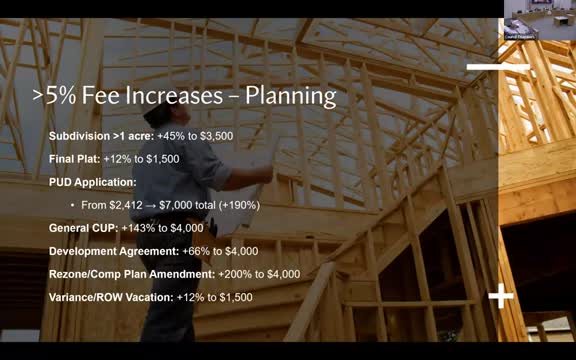City Council Approves Significant Fee Increases for Subdivision and Conditional Use Permits
August 02, 2025 | Sandpoint, Bonner County, Idaho
This article was created by AI summarizing key points discussed. AI makes mistakes, so for full details and context, please refer to the video of the full meeting. Please report any errors so we can fix them. Report an error »

The City of Sandpoint's special council meeting on July 30, 2025, focused on significant changes to the city's permit fee structure. City officials, including the city planner, building official, and city engineer, reviewed the current fees, which had been increasing by 2.5% to 3% annually. They questioned whether these fees accurately reflected the staff time and resources required for processing various permits.
The review revealed that many fees were considerably lower than the actual effort involved in processing applications. As a result, the council proposed substantial increases to better align fees with the staff workload. For instance, the fee for subdividing parcels larger than one acre will rise by 45%, acknowledging the complexity and time required for such applications.
Other notable changes include a 12% increase for final plat applications and a significant restructuring of the conditional use permit (CUP) fees. The CUP fee will now be divided into stages, with an initial charge of $3,500 for the preliminary development plan and an additional $3,500 for the final stage, totaling $23,500. This adjustment reflects the extensive process involved, which includes multiple rounds of hearings and notices.
The council also clarified that while the fees for simpler applications, such as food truck permits, remain low—around $200 to $300—more complex projects will incur higher costs. This new fee structure aims to ensure that the city's permit fees are more proportional to the actual resources required for processing applications, ultimately enhancing the efficiency of city planning and development processes.
The council's decision marks a significant shift in how Sandpoint manages its development applications, with the potential to impact future projects and the overall growth of the community.
The review revealed that many fees were considerably lower than the actual effort involved in processing applications. As a result, the council proposed substantial increases to better align fees with the staff workload. For instance, the fee for subdividing parcels larger than one acre will rise by 45%, acknowledging the complexity and time required for such applications.
Other notable changes include a 12% increase for final plat applications and a significant restructuring of the conditional use permit (CUP) fees. The CUP fee will now be divided into stages, with an initial charge of $3,500 for the preliminary development plan and an additional $3,500 for the final stage, totaling $23,500. This adjustment reflects the extensive process involved, which includes multiple rounds of hearings and notices.
The council also clarified that while the fees for simpler applications, such as food truck permits, remain low—around $200 to $300—more complex projects will incur higher costs. This new fee structure aims to ensure that the city's permit fees are more proportional to the actual resources required for processing applications, ultimately enhancing the efficiency of city planning and development processes.
The council's decision marks a significant shift in how Sandpoint manages its development applications, with the potential to impact future projects and the overall growth of the community.
View full meeting
This article is based on a recent meeting—watch the full video and explore the complete transcript for deeper insights into the discussion.
View full meeting